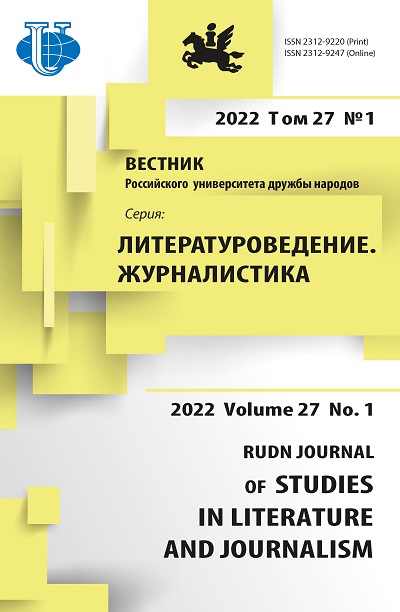Reception of F.M. Dostoevsky’s Works in Tatar Literature and Literary Criticism
- Authors: Galimullina A.F.1, Sharyafetdinov R.K.2
-
Affiliations:
- Kazan (Volga Region) Federal University
- Moscow Pedagogical State University
- Issue: Vol 27, No 1 (2022)
- Pages: 19-29
- Section: LITERARY CRITICISM
- URL: https://journals.rudn.ru/literary-criticism/article/view/30717
- DOI: https://doi.org/10.22363/2312-9220-2022-27-1-19-29
- ID: 30717
Cite item
Full Text
Abstract
The article examines the appeal of Tatar writers to the work of F.M. Dostoevsky, the dialogue with the writer in their works. It also analyzes the translation of the novel Crime and Punishment into the Tatar language. The study of dialogical relations of Tatar writers with the work of F.M. Dostoevsky by modern Kazan literary critics helps to identify the complex and multidimensional history of interaction of Tatar writers of the twentieth century with Russian classics. Having studied the scientific works of V.R. Amineva, L.K. Bayramova, D.R. Moskaleva, K.S. Minnibaev, E.G. Nigmatullina, Yu.G. Nigmatullina, M.M. Khabutdinova, Z.Z. Shagiakhmetov, as well as the translation of the novel Crime and Punishment by R. Dautov, it was concluded that in the works of G. Iskhaki, F. Amirkhan, G. Ibragimov, A. Gilyazov, an appeal to the artistic and philosophical heritage of F.M. Dostoevsky was manifested in the creative and original understanding of the moral and philosophical ideas and deep psychologism of the Russian classic, the desire to reveal the phenomena of modern Tatar reality more fully through the prism of his ideas.
About the authors
Alfiya F. Galimullina
Kazan (Volga Region) Federal University
Email: alfiya_gali1000@mail.ru
Doctor of Pedagogy, Professor of the Department of Institute of Philology and Intercultural Communication 18 Kremlevskaya St, Kazan, 420008, Russian Federation
Ramil Kh. Sharyafetdinov
Moscow Pedagogical State University
Author for correspondence.
Email: rkh.sharyafetdinov@mpgu.su
ORCID iD: 0000-0002-2311-3820
PhD, Associate Professor of the Department of Russian Literature XX-XXI Century
1 Malaya Pirogovskaya St, Moscow, 119991, Russian FederationReferences
- Amineva, V.R. (2010). F.M. Dostoevsky and H. Ibragimov: Types of Dialogical Relations. Problems of Philology of the Peoples of the Volga Region. Materials of All-Russian Scientific-practical Conference. April 1–2, 2010. (Vol. 4, pp. 41–44). Moscow, Yaroslavl: Remder publ. (In Russ.)
- Amineva, V.R. (2010). Types of Dialogical Relations between National Literatures (Based on the Works of Russian Writers of the Second Half of the XIX Century and Tatar Prose Writers of the First Third of the XX Century). Kazan: Kazan. GOS. UN-t publ. (In Russ.)
- Bayramova, L.K., & Moskaleva D.R. (2011). Translation of the Phraseology of F.M. Dostoevsky’s Novel “Crime and Punishment” into Tatar and French. Bulletin of the Tatar State University for the Humanities [Bulletin of the TSU], 4(26), 155–160. (In Russ.) Bakhtin, M.M. (1963). Problems of Dostoevsky’s Poetics. Moscow. (In Russ.)
- Gyileyev, A. (1997). Yagez, Ber Doga! Roman-khatir. Kazan: Tatar. kit. nashr. publ.
- Dostoevsky, F.M. (1974). Uninayat hamzаaza. Trans. by Rais Dautov. Kazan: Tatar. kit. nashr. publ.
- Iskhakiy, G. (1991). Zindan. Sailanma prose ham sahn asarlare. Kazan.
- Karimullin, A.G. (1962). Tatar Literature in Translations into Russian (Bibliographic Index. 1917–1960). Kazan: Kazan. un-t publ. (In Russ.).
- Khabutdinova, M.M. (2011). The Role of F.M. Dostoevsky in the Formation of Ayaz Gilyazov as a Writer. Bulletin of the Tatar State University for the Humanities [Bulletin of the TSU], 4(26), 258–265. (In Russ.)
- Minnibayev, K.S. (2004). Translation is an Art: The Golden Age. Kazan: Kaz. un-t publ. (In Russ.)
- Nigmatullin, E.G. (2002). Dialogue of Literatures: Index of Translations of Works of Russian Literature into the Tatar Language. Kazan: “Unipress” publ. (In Russ.)
- Nigmatullina, Yu.G. (1997). Types of Cultures and Civilizations in the Historical Development of Tatar and Russian Literature. Kazan: Fan publ. (In Russ.)
- Shagiakhmetov, Z.Z. (2006). The Motive of Sacrifice in the Works of F.M. Dostoevsky and A. Gilyazov. Dialogue of Cultures: Russian-Tatar Interrelations. Part III. Issue 2. Moscow, Yaroslavl: Remder publ., 68–72. (In Russ.)
Supplementary files















